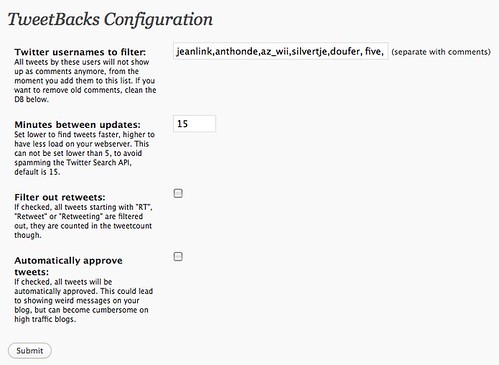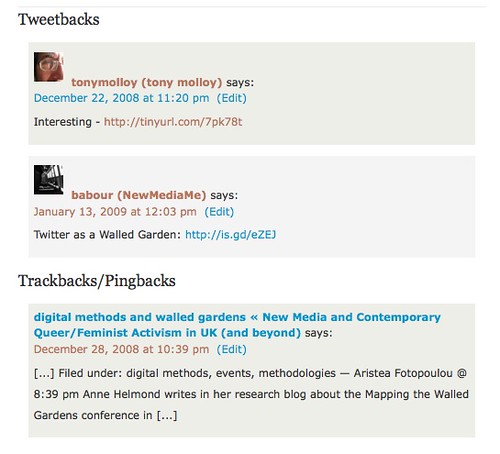I recently installed the Tweetbacks plugin by Joost de Valk which adds tweets that link to your blog posts as comments:
People are talking about your posts, and not only in the comments to your post. A lot of that conversation is happening on Twitter, and now, you can take that conversation right back to your blog! This plugin imports those tweets about your posts as comments. You can display them in between the other comments on your blog, or display them separately.(Yoast)
The name Tweetback refers to the Trackback and the Pingback, the two common link-notification systems in blogs. For more information On Using Manual and/or Automatic Link Notification Systems read my post on the Blog Herald. The spam problem that has haunted both the trackback and the pingback is now also haunting the tweetback. The initial version of the plugin automatically approved every single tweetback which caused a lot of spam in my comments. The current version both allows you to disable automatic approval but it also allows you to filter usernames. This is a great improvement over the first version but it still requires a lot of manual moderation.
This manual moderation in the case of trackback and pingback spam has been largely automated through anti-spam plugins which are quite good at keeping the spam out. Unfortunately the tweetback is not an official protocol nor largely adopted yet so there is no anti-spam mechanism available except for manually filtering out those accounts that spam you.
So why am I experimenting with Tweetbacks? Because, as the plugin description states, a lot of the blog conversation is moving to Twitter. So far, most tweetbacks aren’t conversational responses but link recommendations to my blog posts. However, I do feel that this plugin might provide valuable insights into connecting two platform that I see as complementary: blogs and Twitter.
Jonathan Bailey raises Tweeback copyright issues on the Blog Herald in Tweetbacks, Copyright and Scraping by stating that
Where trackbacks are sent from the linking site and comments are left intentionally by the visitor, these plugins are different in that they activelhy go out in search of these “tweetbacks†(including parsing URL shortening services), even though the creator has taken no steps to ensure they appear on the site.
I see linking as an active state of connecting one page to another, whether it’s a Twitter status or a blog post. Linking is always a conscious choice and as the web is built on links there will always be tools that will want to connect as many links as possible. If you don’t want to appear on a site, then don’t link.


interessant. http://tinyurl.com/6suvlk
A very good point was raised in the comments on Jonathan’s post: Twitter has the following passage in its Terms:
Which basically means that everyone has the right to do this.
Excellent addition to the copyright issue. Unfortunately I missed that comment as I had already drafted this post before that comment was posted. Learns me to always return to the conversation to check recent comments before posting the actual post.
Retweeting a tweetback http://is.gd/gsUz My 00:02:04 minutes of fame :-)
TweetBacks, klinkt als logisch en goed idee van @annehelmond http://bit.ly/rOhp
Thanks for your post about the TweetBacks spamming issue. It was your post (among a few others) that led me to the conclusion that the problem was not my own isolated incident and that keeping the plug-in was simply more trouble than it was worth. If you’re interesed, I’ve blogged about my experience:
http://www.ninja-nerd.com/wordpress-plug-in-tweetbacks-considered-harmful/